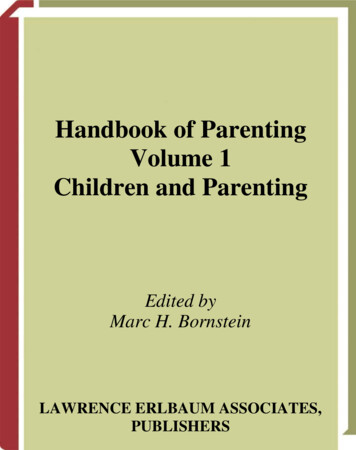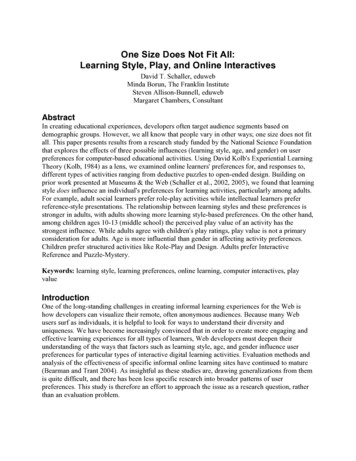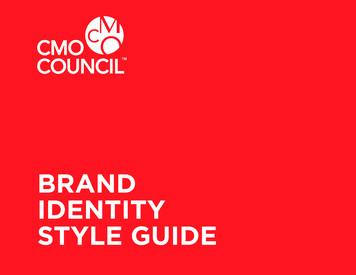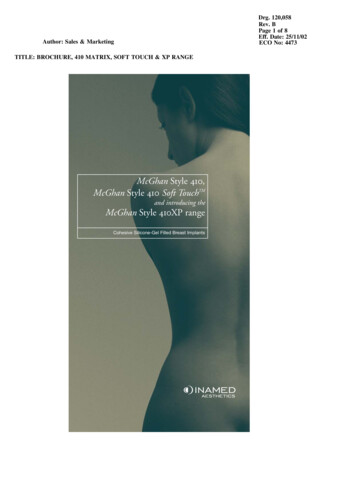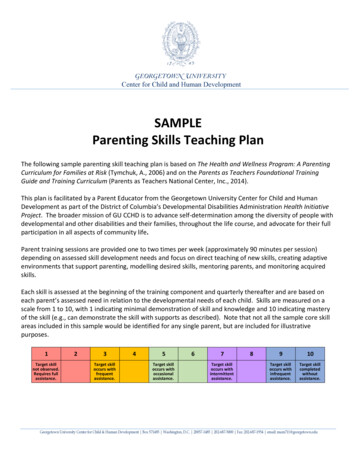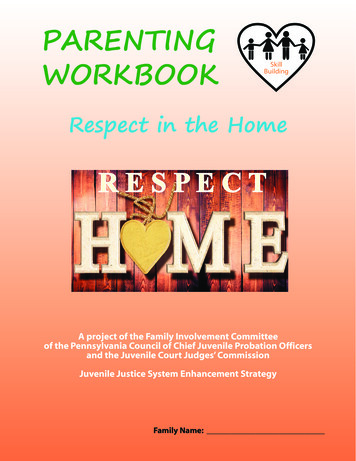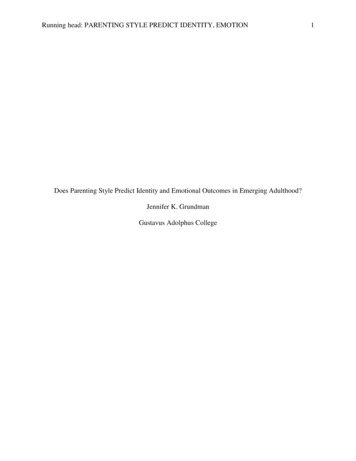
Transcription
Running head: PARENTING STYLE PREDICT IDENTITY, EMOTIONDoes Parenting Style Predict Identity and Emotional Outcomes in Emerging Adulthood?Jennifer K. GrundmanGustavus Adolphus College1
PARENTING STYLE PREDICT IDENTITY, EMOTION2AbstractPast research has examined the role of parenting style in identity development and academicadjustment (Roth et al., 2009), but the role of self-regulation is yet to be determined. The presentstudy examined the influence of two parenting styles—parental autonomy support and parentalconditional regard—during emerging adulthood as it relates to self-regulatory style, explorationand commitment of identity, and emotional outcomes such as self-esteem and satisfaction withlife. Eighty undergraduate students completed an on-line survey. Preliminary results indicatedthat parental autonomy support was positively correlated with internal self-regulation, identitydevelopment, and emotional outcomes. Parental conditional regard was positively correlatedwith external self-regulation and negatively correlated with emotional outcomes. Regressionanalyses confirmed that parenting style predicts identity and emotional outcomes duringemerging adulthood, suggesting that these outcomes are a function of parenting behavior.
PARENTING STYLE PREDICT IDENTITY, EMOTION3Does Parenting Style Predict Identity and Emotional Outcomes in Emerging Adulthood?Parents influence their children during each stage of life. In infancy, parents interact withtheir children and choose their clothing, diet, and entertainment. Throughout childhood, theydetermine with whom their children interact, the activities in which their children participate, andhow their children manage their emotions. During adolescence, parents exert their influence byproviding advice about schoolwork, social dilemmas, and values. Throughout development fromchildhood to adolescence, parents play an important role in the formation of their child‘sregulation of emotions and behaviors, as well as their child‘s self-esteem and identity (Shaffer &Kipp, 2010). The purpose of this study was to examine the ways in which parenting styleinfluences the decisions children make and the ways in which children manage aspects of theirlives that pertain to motivation and identity development.Emerging AdulthoodEmerging adulthood is a period of development that occurs between adolescence andyoung adulthood, when individuals are roughly 18 to 25 years of age, and is characterized bychange and exploration of possible life paths (Arnett, 2000, 2004, 2007). Many emerging adultsrecognize that they are no longer adolescents but that they do not yet perceive themselves asadults. The feeling of being in-between stems from the transient nature of emerging adulthood—many emerging adults have temporary residences, short-term school commitments or unsettledcareer paths, and romantic relationships that are rather flexible (Arnett, 2000).Identity development plays a prominent role in emerging adulthood as individuals areexposed to many opportunities to explore career paths, romantic relationships, and worldviews.At the same time, emerging adults progress toward greater independence from their parents(Schwartz, Cote, & Arnett, 2005). As they gain independence, emerging adults assume
PARENTING STYLE PREDICT IDENTITY, EMOTION4responsibility for their identity and actively pursue new opportunities which then lead to moreenduring choices (Arnett, 2000). For example, emerging adults begin to determine what sort ofromantic partner they desire or which occupation best fits their talents. It is through theseexplorations that emerging adults determine who they are and what they want out of life (Arnett,2004).Some emerging adults are more advanced than others in terms of identity development.Schwartz et al. (2005), in a study of emerging adults and identity development across ethnicgroups, found that agency, or self-direction, is positively correlated with exploration, flexiblecommitment, and deliberate choice making. These findings suggest that a sense of self-directionis an important component of healthy identity development in emerging adulthood. Thus, it isimportant to explore how a sense of agency develops during adolescence and continues to evolveas emerging adults make progress in their identity development.Just as changes occur in their own identities, changes also occur in the relationship thatemerging adults have with their parents. The dynamics of the parent-child relationship shiftduring emerging adulthood so that parents are no longer seen as dominant figures and childrenare no longer in a subordinate or dependent role. Emerging adults may begin to see their parentsas companions, not just as parental figures; likewise, parents begin to see their children as peers,not just as their dependents (Arnett, 2004). According to Arnett, parents no longer need toenforce house rules and can, instead, develop a friendlier and less directive relationship withtheir children. It is also during this time that emerging adults acknowledge their parents‘ goodand bad qualities, and begin to see them as complex individuals. The role of parents, and theirparenting styles in particular, is the primary focus of the following research study.Parenting Style
PARENTING STYLE PREDICT IDENTITY, EMOTION5Parenting style has been referred to as a socialization approach to raising childrenthrough which parents teach their children norms, values, behavior, and social skills (Deci,Eghrari, Patrick, & Leone, 1994; Deci & Ryan, 1995). The present research project focused ontwo parenting styles, parental autonomy support and parental conditional regard, both of whichinvolve distinct ways of reacting to desirable and undesirable behaviors (Joussemet, Landry, &Koestner, 2008; Roth, Assor, Niemiec, Ryan, & Deci, 2009).Parental Autonomy Support. Parents with the autonomy support parenting styleencourage their children to be self-starters, independent decision makers, and autonomousindividuals. Parents actively support their children by providing rationale for their requests,recognizing and discussing the feelings of their children, offering choices to foster decisionmaking skills, and minimizing the use of controlling techniques such as conditional affection(Joussemet et al., 2008). For example, parents might ask their children to clean up their room andthen explain that the task of cleaning teaches personal responsibility for their belongings and forcompleting tasks. Or, parents might ask their children to talk about their emotions following atemper tantrum or dispute. As a result of the consistent support from their parents, childrendevelop the ability to regulate their emotions and make self-directed, autonomous decisions.Parental autonomy support has been found to correlate positively with positive emotionaloutcomes. In fact, many research studies (e.g., Joussemet et al., 2008; Luyckx, Soenens,Goossens, & Vansteenkiste, 2007) have found parental autonomy support to have positive effectson children‘s self-regulation, achievement, social skills, academic adjustment, and identificationwith choices like college major. Roth et al. (2009) found that autonomy support would leademerging adults to have a sense of choice during identity development, integrative regulation ofemotions, and an increased level of exploration. Thus, not only is autonomy support linked with
PARENTING STYLE PREDICT IDENTITY, EMOTION6positive emotional outcomes and identity development, but it is also related to emotional andbehavioral regulation that is internalized within one‘s sense of self.Parental Conditional Regard. In contrast to parental autonomy support through whichparents provide unconditional support for their children, parental conditional regard motivateschildren to exhibit desirable behaviors by making parental affection contingent on the child‘sgood or bad behavior (Roth, et al., 2009; Barber, 2002). There are two types of conditionalregard: positive and negative. Positive regard involves providing more affection for goodbehavior while negative regard involves withdrawing affection for bad behavior. For example,children who earn good grades in school might be rewarded with verbal praise, ―job well done!‖and a hug from their parents. On the other hand, children who earn poor grades in school mightbe given the cold shoulder or ignored by their parents.Conditional love and conditional parenting seem inherently bad because both imply thatlove is not always available. However, mainstream parenting experts often advise parents to beconditional parents. Alfie Kohn, author of the book Unconditional Parenting: Moving fromRewards and Punishments to Love and Reason, writes about Dr. Phil McGraw from the TVshow, Dr. Phil, and Jo Frost from the parenting TV show, Supernanny. Kohn (2009) argues thatparents are frequently advised to give attention, praise, and love as rewards for good behaviorand to withdraw love through a time-out, for example, in response to bad behavior. In agreementwith researchers such as Roth et al. (2009), Kohn indicates that children who are parented withconditional love learn that they must earn a parent‘s love, a lesson that has harmful psychologicaleffects.Children who are parented in this way quickly learn to discriminate between desirableand undesirable behavior depending on the response they elicit from their parents, which then
PARENTING STYLE PREDICT IDENTITY, EMOTION7increases the likelihood that children will act on those behaviors deemed desirable by theirparents. However, researchers have found conditional regard to be positively correlated withnegative emotional consequences. Although children learn to discriminate between good and badbehavior, they also learn that affection is dependent on their enactment of certain behaviors,which contributes to the development of contingent self-esteem, or self-esteem that depends onsuccess in certain domains (Assor Roth, & Deci, 2004).Conditional regard has also been linked to low self-esteem. Assor et al. (2004) addressedthe emotional impact of parental conditional regard in a population of mothers and daughterswho had conditional parents. Mothers whose parents were conditionally affectionate reportedlow levels of self-worth and were more likely to parent their children in the same way.Furthermore, Assor et al. found that mothers and their daughters reported a strong internalcompulsion to enact behaviors with which they did not strongly identify. In other words, theyenacted behaviors that did not agree with their personal identity. The results of this study suggestthat conditional parenting leads individuals to regulate their behavior according to externalexpectations or constraints.A similar study by Roth et al. (2009), looked at the emotional and academic influence ofpositive and negative conditional regard among high school students. Both types of conditionalparenting were found to have negative consequences for motivation, emotional well-being, andbehavior. Roth et al. also found that each type of conditional regard—positive and negative—differentially affected motivation and behavior. Positive regard predicted an internal compulsionto enact behaviors and highly constricted behavior, while negative regard predicted enactment ofundesirable behavior, academic disengagement, and resentment toward parents. Again, theresearch suggests that conditional regard, both positive and negative, leads individuals to
PARENTING STYLE PREDICT IDENTITY, EMOTION8regulate their behavior either because they feel compelled to do so or, in the case of academicdisengagement, they lack motivation. In fact, Roth et al. (2009) found that negative regard ledchildren to enact behaviors opposite of that which their parents considered desirable.Self-Regulation.Past research has found that parenting style is related to the way in which children selfregulate their behavior. Self-determination theory (Deci & Ryan, 1985, 2008) suggests thatpeople are naturally motivated to internalize, or integrate the regulation of important activities orbehaviors into their concept of the self. If a behavior is successfully internalized it is said to beself-determined because the individuals have identified with the behavior and integrated it intotheir identity. For example, parents request that their children clean their rooms and childrenusually comply with this request. If children have internalized the external request from theirparents, the children clean their rooms whether or not their parents ask. Perhaps the children findcleaning their room to be satisfying, and have included the value of cleanliness in their identity.The extent to which individuals have internalized, or taken into their identity, valued activities orbehaviors determines their self-regulatory style.According to Koestner, Losier, Vallerand, and Carducci (1996) and Losier, Perrault,Koestner, and Vallerand (2001), there are four regulatory styles: intrinsic motivation,identification, introjection, and amotivation. Intrinsic motivation is an internalized selfregulatory style in which behaviors are performed because they are inherently satisfying andinteresting, such as the room-cleaning example. Identification is also an internalized selfregulatory style in which behaviors are performed because they are personally importantalthough they are not necessarily inherently interesting. The third self-regulatory style is calledintrojection, which means that behaviors are motivated by external factors such as a parent‘s
PARENTING STYLE PREDICT IDENTITY, EMOTION9request. Last, amotivation is characterized by passivity and an absence of motivation. Anindividual with the amotivation self-regulatory style is unlikely to begin the internalizationprocess or engage in behaviors.Each self-regulatory style has been found to correlate with specific psychologicaloutcomes. Deci et al. (1994) found internalized self-regulation (i.e., intrinsic and identification)to be associated with positive outcomes such as creativity, cognitive flexibility, achievement,satisfaction, and physical and psychological health. Introjection, on the other hand, has beencorrelated with negative outcomes. In a study of political attitudes and behavior, Koestner et al.(1996) reported introjection to be associated with approval-based pressures that result inbehavioral regulation that is based on guilt, anxiety avoidance, and self-esteem maintenance.Likewise, Deci et al. (1994) explained that introjection is related to pressure, tension, andanxiety. Essentially, individuals with an introjected self-regulatory style perform a behaviorbecause they feel as if they ought to. Koestner et al. (1996) also found that amotivation is relatedto passivity, distress, and poor adaptation.The development of self-regulatory style is influenced by social contexts, such as thosecreated by various parenting styles (Deci et al., 1994). Specifically, supportive social contextsthat provide a rationale for requests, acknowledge emotions, and provide opportunities forchildren to make choices (i.e., what beverage to drink with dinner) promote internalized selfregulation and self-determined behavior because children are encouraged to make independentdecisions and act autonomously. In contrast, non-supportive contexts that do not provideopportunities for children to exercise their autonomy lead to introjection. This suggests that selfregulatory style is, in part, a function of whether or not the social context is supportive, and thuspromotes or hinders the internalization process.
PARENTING STYLE PREDICT IDENTITY, EMOTION10Identity DevelopmentParenting style and self-regulation of behavior influence the way in which children makedecisions, which relate directly to the process of identity development and choices about one‘slife path. Marcia (1980) defined identity as a dynamic, self-constructed organization of abilities,beliefs, needs, and personal experiences. According to Marcia (1966, 1980), identitydevelopment is a function of exploration and commitment. Exploration refers to how muchindividuals have considered various viewpoints within a particular realm of their life. Forexample, individuals who consider what it means to be liberal and conservative have exploredwithin the realm of political identity. Commitment refers to whether or not individuals havedecided which viewpoint suits them best. Perhaps the same individuals decide that they identifymost with conservative politics and commit to that ideology.In effect, identity development is a decision making process by which the individualexplores and commits to various viewpoints regarding the self. Emerging adults, in particular,constantly make decisions that contribute to their identity development as they consider anddecide where to attend college, whom to date, where to work, what to major in, and whether ornot they should socialize or study (Arnett, 2000, 2004, 2007). Marcia used exploration andcommitment to categorize individuals into four discrete identity statuses: diffused, foreclosed,moratorium, and achieved.Individuals who score low on exploration and low on commitment (i.e., diffused identitystatus) characteristically lack volition to explore and to commit to what works best. Theseindividuals often have low self-esteem, low autonomy, and external orientation suggesting thattheir behavior is externally driven. Marcia referred to individuals with low exploration and highcommitment (foreclosed) as doing what their parents tell them to do. For example, college
PARENTING STYLE PREDICT IDENTITY, EMOTION11students whose parents strongly encourage attending medical school decide to be a doctor beforeexploring other career paths or whether or not this career path is relevant to their interests andabilities. Individuals who score high in exploration but low in commitment (moratorium) areworking to distinguish their own goals by engaging in extensive exploration; this identity statusis associated with high levels of anxiety as these individuals are unsure of their identity. Last,high exploration and high commitment individuals (achieved) have adequately explored andhave committed to those options that suit them best. These individuals report high self-esteem,high autonomy, and internal orientation which means that goal-oriented behavior is internallydriven or self-determined (Marcia, 1966; Rowe & Marcia, 1980; Schwartz, 2002; Luyckx,Goossens, & Soenens, 2006).Marcia (1980) also found that individuals described their relationship with their parentsdifferently depending on the extent of their identity development. Those with high explorationand commitment (i.e., achieved) reported positive or ambivalent relationships while those withhigh exploration and low commitment (i.e., moratorium) reported that their parents weredisapproving and disappointed. Individuals who scored low on exploration but high oncommitment (i.e., foreclosed) reported that their parents were loving and affectionate, but thatthey felt pressure to conform to expectations. And, individuals who scored low on bothexploration and commitment (i.e., diffused) reported feeling distant from their parents and thattheir parents misunderstood them. They also reported feelings of rejection and detachment fromtheir parents. Thus, identity development appears to be related to parenting style and the way inwhich children relate to their parents.Emotional Outcomes – Global and Contingent Self-Esteem, and Satisfaction With Life
PARENTING STYLE PREDICT IDENTITY, EMOTION12In addition to the role parents play in their children‘s behavioral regulation and identitydevelopment, parents also help children develop self-esteem and the ability to regulate theiremotions (Shaffer & Kipp, 2010). Global self-esteem is a positive or negative attitude toward theself (Rosenberg, 1989). High global self-esteem indicates that individuals think that they arepersons of worth, whereas low global self-esteem is characterized by rejection of self anddissatisfaction with self. High self-esteem, or thinking positively of oneself, is related to moreeffective behavior and better adjustment in comparison to low self-esteem (Deci & Ryan, 1995).Crocker, Luhtanen, Cooper, and Bouvrette (2003) suggest that self-esteem might bedependent, or contingent, upon feelings of worth within certain domains. The theory ofcontingent self-esteem holds that self-esteem is dependent on performance in particular domains,such as family support and academic competence (Crocker et al., 2003; Crocker & Knight,2005). Individuals are selective, sometimes unconsciously, about which domains contribute totheir self-worth, and individuals strive to achieve success and avoid failure in the selecteddomains—the domains on which their self-esteem is dependent.Deci and Ryan (1995) noted that the socializing context, or parenting style, influencesself-esteem such that individuals who are supported and loved are able to behave autonomouslyand develop noncontingent or global self-esteem. On the other hand, those who are loved onlyafter meeting their parents‘ expectations tend to develop more contingent self-esteem because thepraise they receive from doing well teaches them that success feels good and failure does not.Thus, parenting style is linked to the development of global and/or contingent self-esteem.Satisfaction with life is yet another indicator of psychological well-being. Pavot andDiener (1993, 2008) defined the construct of satisfaction with life as a judgmental process inwhich individuals assess the quality of their life on the basis of a personal set of criteria. In this
PARENTING STYLE PREDICT IDENTITY, EMOTION13study, global self-esteem, contingent self-esteem, and satisfaction with life were used asemotional outcomes to measure the effects of parenting style on emerging adults‘ emotionalwell-being.Present StudyParenting style, according to the literature, functions as a socializing context through whichchildren learn how to behave, make decisions, and manage their emotions. This study focuses onthe role of parenting style in self-regulation and identity development during emergingadulthood, as well as the relationship between parenting style and emotional outcomes such asself-esteem, contingent self-esteem, and satisfaction with life. Unlike previous research, thisstudy proposes a mediational role for self-regulation, such that parenting style predicts identitydevelopment through its relationship with self-regulation. Also, this study examines therelationship between parenting style, and parental conditional regard in particular, withcontingent self-esteem.Predictions.1. Parental autonomy support was expected to positively predict instrinsic and identifiedself-regulatory style, and high exploration and commitment. Parental autonomysupport was expected to correlate positively with global self-esteem and satisfactionwith life.2. Positive conditional regard was expected to positively predict introjection andamotivation self-regulatory style, and either exploration or commitment. Positiveconditional regard was expected to correlate positively with contingent self-esteemand satisfaction with life.
PARENTING STYLE PREDICT IDENTITY, EMOTION143. Negative conditional regard was expected to positively predict introjection andamotivation self-regulatory style, and either exploration or commitment. Negativeconditional regard was expected to correlate positively with contingent self-esteemand negatively with satisfaction with life.MethodParticipantsEighty undergraduate volunteers (64 females and 16 males) from General Psychologycourses at a small private college were recruited through an online experiment managementsystem to participate in this study. The average age of the participants was 18.82 (SD 0.8); 85%of the participants were freshmen, 10% were sophomores, and 5.1% were juniors or seniors. Allmeasures were formatted into an electronic questionnaire for participants to complete online andcourse credit was given to each participant upon completion of the study.MeasuresEgo Identity Process Questionnaire (EIPQ; Balistreri, Busch-Rossnagel, &Geisinger, 1995). The identity development variables exploration and commitment weremeasured using the Ego Identity Process Questionnaire. The EIPQ contains 32 items, half ofwhich reflect commitment to certain beliefs (e.g., I have definitely decided on the occupation Iwant to pursue) while the other half reflect exploration (e.g., I have considered adopting differentkinds of religious beliefs). Twelve items are reverse scored. Participants rated the degree towhich they agreed with each item on a 6-point Likert scale. Positive items were scored such that1 signified strong disagreement and 6 signified strong agreement; scoring was reversed fornegative items. Sums were calculated for each identity dimension—commitment andexploration. Balistreri et al. evidenced reliability for the EIPQ instrument with internal
PARENTING STYLE PREDICT IDENTITY, EMOTION15consistency coefficient alphas of .80 for commitment and .86 for exploration; test-retrestreliability coefficients were .90 for commitment and .76 for exploration. Balistreri et al. found asignificant relationship between identity status and measures of self-esteem, masculinity, andlocus of control suggesting strong construct validity. Factor analysis also showed validity for thetwo-factor model.Perceptions of Parents Scale (POPS; Luyckx et al., 2007). To measure the autonomysupport parenting style, participants completed a revised version of the Perceptions of ParentsScale which consists of seven items that assess the extent to which individual parents supporttheir child unconditionally, as perceived by the child. Each participant completed the scale twice,once for father and once for mother. Revisions were made by the researcher to ensure that thescale measured autonomy support within the academic domain. Each item was scored on a 5point Likert scale in which 1 denoted disagreement and 5 denoted agreement; two items werereverse scored. Sample items included ―My father/mother allows me to decide things aboutschool for myself‖ and ―My father/mother helps me to choose my own direction in school‖.Chronbach alphas for autonomy support were .78 and .74, which indicates good reliability.Luyckx et al. (2007) found that autonomy support was negatively correlated with psychologicalcontrol (r -.66 and r -.62), suggesting strong construct validity.Parental Conditional Regard Scales (Roth et al., 2009). The Parental ConditionalRegard Scales were used to assess the extent to which the participants‘ parents used conditionalregard, which involves providing or withdrawing love in response to a child‘s behavior, asperceived by the participants. Specifically, this study included two scales—one for negativeconditional regard and another for positive conditional regard; both scales pertained to theacademic domain. Each scale featured five items and participants are asked to rate their
PARENTING STYLE PREDICT IDENTITY, EMOTION16agreement on a 5-point Likert scale such that 1 indicated disagreement and 5 indicatedagreement. A sample item for positive regard is, ―When I get a good grade at school, I feel thatmy mom/dad gives me more warmth and affection than she usually does.‖ A sample item fornegative regard is, ―If I get a non-satisfactory grade at school, I feel that my mom/dad loves meless‖. Each participant completed the positive and negative scales once for each parent. Roth etal. (2009) conducted a pilot study, which determined that participants were able to distinguishbetween positive regard, negative regard, and psychological control, suggesting constructvalidity for the two scales. Assor et al. (2004) found Cronbach alpha for the father scale to be0.83 and 0.87 for the mother scale, indicating strong reliability.Rosenberg Self-Esteem Scale (RSES; Rosenberg, 1989; Brown, 1998). The RosenbergSelf-Esteem Scale consisted of 10 items designed to measure global self-esteem, or theparticipants‘ general feelings toward themselves. Each item required the respondent to rate theextent to which they agreed on a 4-point Likert scale where 0 expressed strong disagreement and3 expressed strong agreement. Half of the items were worded positively (i.e., I take a positiveview of myself) and the rest were worded negatively (i.e., I feel I do not have much to be proudof). Scores were summed and ranged between 0 and 30, with higher scores signifying higherself-esteem. Past research has found strong validity and reliability for the RSES. Rosenberg(1989) found that self-esteem was negatively correlated with measures of depressed affect,neuroticism, anxiety, and peer-group reputation, which suggests strong concurrent validity. Paststudies have found alpha reliabilities ranging from .88 to .90 for the RSES (Robins, Hendin, &Trzesniewski, 2001).Contingent Self-Worth Scale (CSWS; Crocker, et al., 2003). In addition to the globalself-esteem measure, participants completed the Contingent Self-Worth Scale to measure
PARENTING STYLE PREDICT IDENTITY, EMOTION17contingent self-worth in relation to the following sources: family support and academiccompetence, as these were most relevant to the present study. The original CSWS included fiveother sources (e.g., others‘ approval, competition, God‘s love, etc.) that were excluded from thisstudy. There were five items for each source, which required participants to rate the extent towhich they agreed on a 7-point Likert scale—1 meant ―strongly disagree‖ and 7 meant ―stronglyagree‖. Sample items included, ―It is important to my self-respect that I have a family that caresabout me‖ and ―My self-esteem is influenced by my academic performance‖. Contingent selfesteem has been correlated with difficulty regulating behavior and feelings of pressure, stress,anxiety, as well as decreased well-being and competitiveness in relationship
love is not always available. However, mainstream parenting experts often advise parents to be conditional parents. Alfie Kohn, author of the book Unconditional Parenting: Moving from Rewards and Punishments to Love and Reason, writes about Dr. Phil McGraw from the TV show, Dr. Phil, and Jo Frost from the
